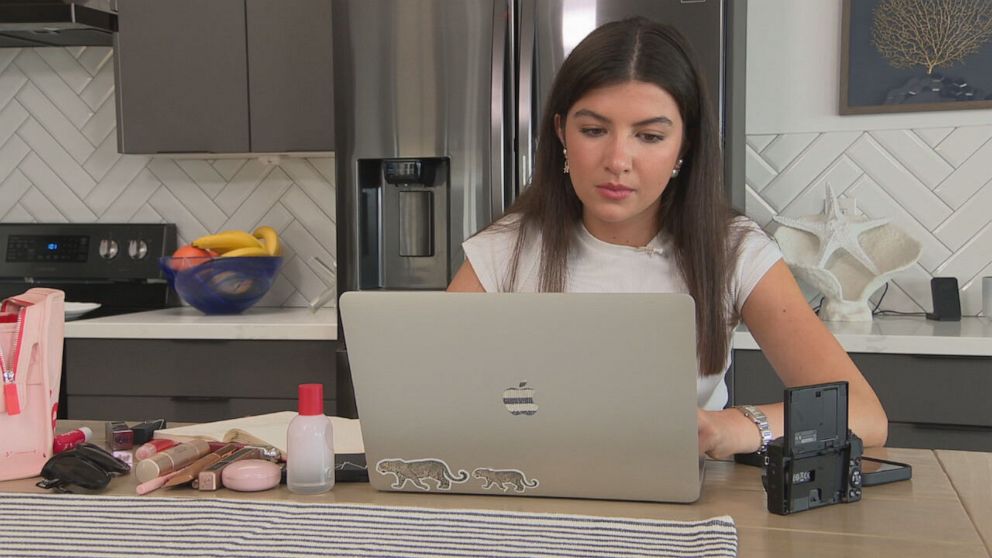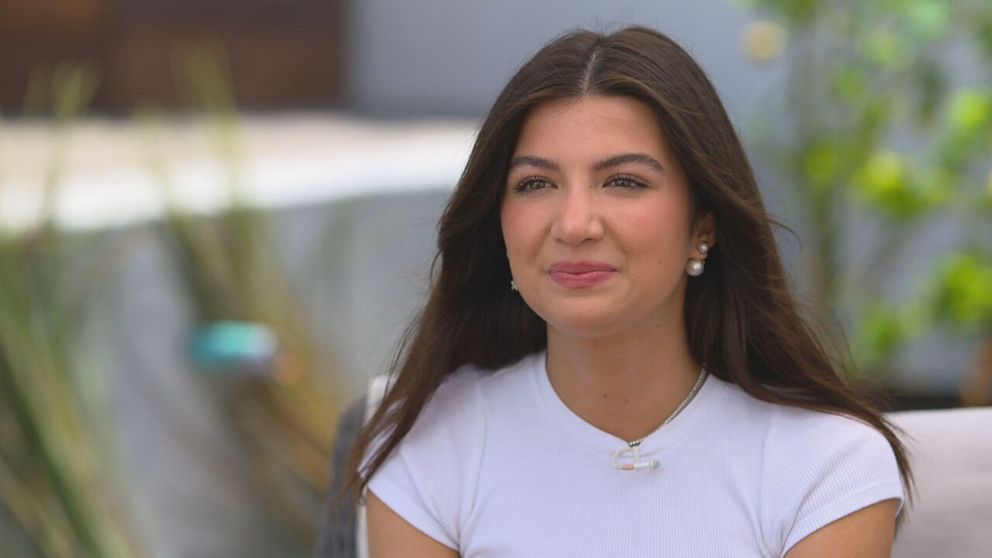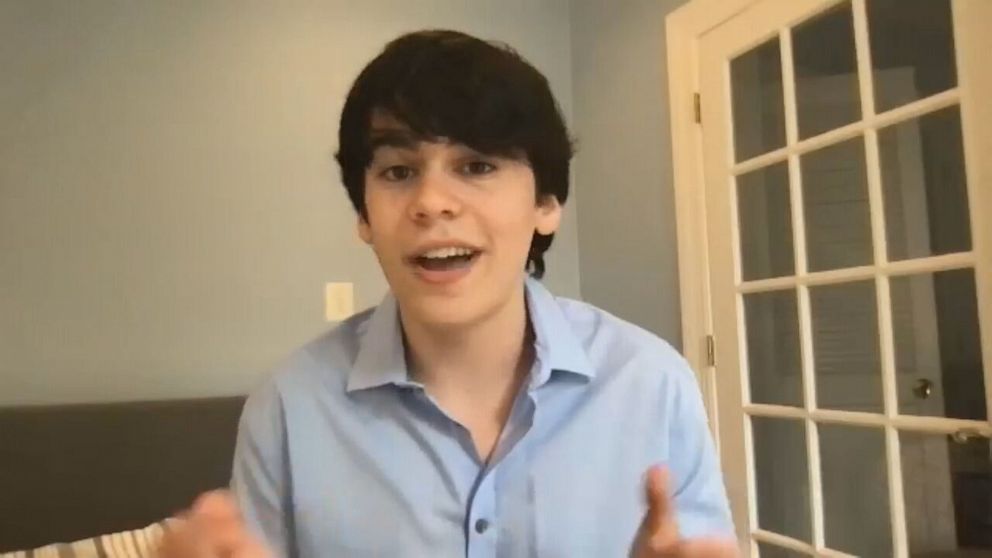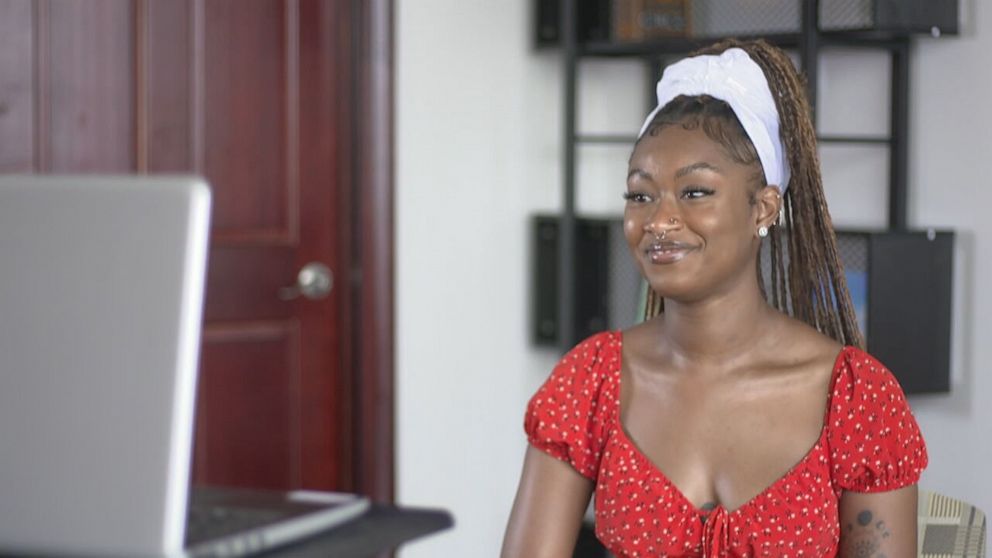Teen social media stars in uphill battle against COVID-19 vaccine misinformation
Some influencers are encouraging vaccinations for free.
Ellie Zeiler is known by her 10 million TikTok followers for her fashion hauls, beauty hacks and viral dance videos.
Although her feed often includes endorsements for major brands, her latest partnership came from the U.S. government, which asked her for help encouraging people to get the COVID-19 vaccine.
“They said they were starting this whole process of reaching out to influencers — people who were in the public eye ... really wanting to stop these rumors and get the word out about the vaccine,” Zeiler told ABC News.
The 17-year-old, who was vaccinated in May, has continued to share her experience of getting the shot in an effort to ease the concerns of other young Americans, which are the least-vaccinated age group in the country.
Watch "Nightline" weeknights at 12:35 a.m. ET on ABC
“I feel great after. I feel like I have this armor around me,” she said. “I had no side effects.”

With the highly contagious delta variant continuing to impact communities and many children already beginning school, there is now a race to inoculate America’s youth.
Youth aged 12 to 15, 16 to17, and 18 to 24 have only 33.9%, 44% and 46.5% of their age group vaccinated, respectively, according to the CDC. Ages 25-39 have 50.8% of their demographic vaccinated.
President Joe Biden’s administration is reaching young people through their smartphones. They’ve enlisted some of the generation’s social media icons, like Olivia Rodrigo and Benny Drama to help get the word out.
Influencers like Zeiler are now helping inform the country about the realities of the vaccine.
“I think that that's just the impact of social media — that anyone can do it — which is very, very special,” Zeiler said.
They aren’t just promoting vaccines, but fighting a growing tide of vaccine misinformation and unfounded conspiracies that have run rampant on social media.
“I was used to, in the beginning of the pandemic … being a friend for these people that followed me … giving them advice on whether it be fashion or friends or people … to [now, I] actually give them useful and straight up factual advice,” she said.

In an effort to encourage the vaccine and dispel misinformation, the Biden administration has organized interviews between Dr. Anthony Fauci, chief medical advisor to the president, and a plethora of creators across social media platforms.
Many creators often rely on paid posts for their income, but many of those who have been working directly with the White House on the vaccine push are doing it for free.
“They're doing it because they believe in it,” Taylor Lorenz, a tech reporter for The New York Times, said.
However, it can’t be forgotten that “promoting vaccination and working with the White House is a status symbol,” Lorenz said. “Dr. Fauci is a hugely viral figure. And by the way, you know, doing an interview with Dr. Fauci, that generates enormous engagement on their social channels. So these influencers are getting a lot from the deal, even if it's not direct payment.”
This is not the first time the government has tapped digital creators to get messaging out.
“It didn't surprise me,” Lorenz told ABC News. “Obama actually leveraged YouTube to promote the Affordable Care Act and encourage people to enroll in their health care program back in the mid-2010s and, obviously, Trump also leveraged influencers. He had very high-profile meme accounts. … This is kind of becoming more and more of a trend among politicians, I think, as they recognize that the media environment has shifted and these influencers are undeniably impactful.”
This trend among politicians has given way for a new generation of creators to organize.
Aidan Kohn-Murphy founded Gen-Z For Change, one of the organizations that Biden’s administration collaborated with to promote the vaccine.
The group has most recently been partnering with MadeToSave, an organization helping share information about the vaccine, the U.S. Dept of Health and Human Services and the White House to combat misinformation and promote vaccination efforts.
Gen-Z For Change is an organization of over 500 creators, who have a combined following of about 432 million people and garner a total of 1.5 billion views a month.

Their efforts have gotten over 27.5 million views on COVID-19 related videos since the start of the pandemic.
“These numbers are huge, and I think for a long time, adults really struggled to contextualize them,” Kohn-Murphy told ABC News. “I think adults are realizing that these numbers … are actual things that you can put into action.”
Gen-Z For Change’s coalition of creators ranges from dancers to comedians to activists.
Missouri-based TikToker Alaysia Brandy, who goes by “Laysie B” online, has over 1.5 million followers. She began her online activism speaking out about social justice issues related to Black and LGBT communities. As the vaccine rolled out, she made it a point to ask Fauci about her community’s vaccination concerns.
“I know people do not trust the government,” she said, adding that she understands why there would be mistrust given the abuse that Black people have faced in the U.S.
“I understand the hesitation... But I also want to make sure that they are getting the research themselves and making sure they have reliable sources … even when I speak on these issues, I also leave [hyper]links in ways that you can go look at it yourself and see this information yourself.”

Brandy said she hopes to bridge the information gap that has resulted in concerns about getting the shot throughout communities of color. In her home state, fewer than 50% of the total population is fully vaccinated and only 28% of the Black community is part of that group.
“In my videos, I do speak in English and Spanish and make sure I have subtitles just because I want to reach the largest audience possible,” Brandy told ABC News. “And I want to make sure that you understand, like I completely understand where you're coming from, and I'm not trying to make you feel any less than whatsoever. But I want to talk about this and I want to understand your concerns.”
She said she wants to make sure she addresses all the reasons someone might be wary of the vaccine.
“You can't lump people in who are distrusting of the government because we have been treated so poorly our entire existence in this country, versus people who just don't believe in science -- because that's two completely different groups,” Brandy said.
“It is definitely very hard to navigate,” she added. “But when it comes to people saying ... ‘The vaccine is going to microchip you’ ... you just want to immediately knock down and debunk the stuff that's disinformation. ... Let's stop the fear mongering so they can actually address the real concerns.”
Lorenz pointed out, however, that the misinformation is only one part of the problem. She said there are influencers who also promote fallacies.
“The campaign is up against a huge tsunami of misinformation on social media. So you have people that are also influencers. They're solely anti-vax influencers,” Lorenz said. “You have tons of other lifestyle influencers and other people who are promoting just absolute lies. … I mean, it's actually shocking that people believe some of this stuff.”
She said that seemingly minor inaccuracies like explaining things out of context "can plant a seed of doubt in peoples’ minds, priming them for “absolutely crazy disinformation.”Gen-Z For Change makes it a point to coach its creators about different types of misinformation online. Kohn-Murphy said he brought misinformation and disinformation specialists to the organization, who taught them about the value of a “truth sandwich.”
“[It’s] kind of coming in with a very empathetic approach, explaining a little bit of the truth behind the vaccine and then kind of dislodging the rumors and the misinformation that the person might believe without making them feel small, because nobody ever wants to be told that they're wrong,” Kohn-Murphy explained. “Then closing out with, again, an empathetic approach and linking them to sources where they can do their own research.”
Each creator that ABC News spoke to noted that some of the inaccuracies they saw online came from their followers’ own parents. Zeiler described this reality as “frustrating.”
“It kind of transferred over [from] what parents wanted, and what adults wanted, which I think [is] why the marketing strategy with the White House was so crucial and so important,” Zeiler said. “Now, I see my friends and people on TikTok who are scrolling through, and they get to be educated themselves before having … past thoughts about the vaccine that their parents created for them, and they get to make their own narrative.”
Brandy said that some of her followers are minors with anti-vax parents who still want to get the vaccine. She said they’ve had to try and convince their parents.“Just talking about how you can help your parents find this information on their own so that they receive it and being able to try to help ease their tensions,” she said.
Experts say it is an uphill battle for these creators. A study published in July by UC San Francisco researchers found that about one in four unvaccinated people aged 18 to 25 said that they “probably will not” or “definitely will not” get the COVID-19 vaccination.
Lorenz said pro-vaccine campaigns do good and can reach millions. However, she said ”it's no match for the stuff that Facebook, YouTube, Twitter, TikTok has allowed to spread rampantly for years.”
“They're up against this very coordinated disinformation network,” she added. “It's very hard. I think it might just be a drop in the bucket in the end. That's not to say that it's not worth doing, but that is all they have control over.”
Kohn-Murphy, on the other hand, believes that if they’re convincing “one person to get vaccinated” or “debunking one person’s misinformed belief” or helping one kid gather the courage to talk to their parents about getting vaccinated, then they’re successful.
A year from now, Brandy said she hopes the pandemic is a thing of the past. She said she wants to do whatever is necessary to make that happen.
“It's definitely a motivation factor in constantly keeping a fire under me to make sure that I'm doing my part and using my platform and my voice to get that information out there to the audience,” she said.
Zeiler, meanwhile, expressed hope and purpose in the work that she’s been doing.
“I hope that I'm helping, especially when I get that one-on-one interaction where [someone tells me], ‘I got my first shot of the vaccine today because I saw your video,’ or, ‘Because I saw you,’ which is so crazy to say out loud,” she said. “But that is what makes me continue [to] want to do it.”




